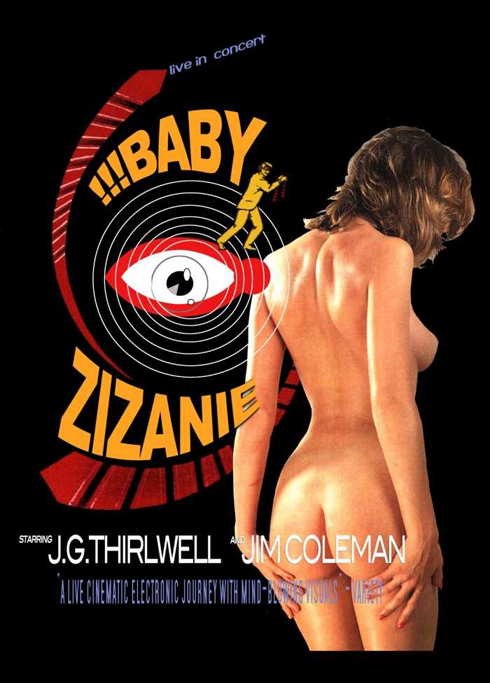Graham: Then you’ll talk about a random bit of British
politics, albeit there is not very much British politics in your lyrics for
five years in the country. But it’s all part of a one, it’s still very
literate. The words are very sharp, it’s not like you don’t know how to write.
You clearly know how to write. You ever want to be a writer, an author, do you
have any old novels that you’ve stuck away in a trunk somewhere, from high
school years?
Thirlwell: I’m going to be writing a memoir, I’ve started
laying the foundation for that. And I don’t want to use a ghost writer, I’d
like to do it myself. I’ve been reading a lot of musicians’ memoirs just to see
what’s out there, how people are doing it. And so that’s been another journey
I’ve been on for the last couple of years, researching all of that. But no, not
really, I don’t think I have a novel in me. I’m not really that interested in
doing that, you know. There are stories that come out from my music, but
they’re not really as fully formed as a novel would be. I know people who are
novelists and I don’t wanna (shaking head) go down that path, it’s pretty hard.
I mean, as you know.
Graham: Yeah. You’re like a shark moving through chummed
sonic waters, right.
Thirlwell: Mmm.
Graham: If you’re a novelist you’ve got to sit down for
six months or a year…I won’t even tell you how long it took me to write my
fucking book (Soundproof in Satellite
Town – Graham), to get rid of it. But it doesn’t strike me that you’d be
comfortable in that kind of environment, where you’ve sitting writing and
rewriting something, because you’re so constantly on the go.
Thirlwell: I did spend years at a time on very ambitious
projects, but I found as part of my work practice that I really value nibbling
at things. As long as I’ve started doing something, I can do a little bit of it
here and there and let it build up. Otherwise…I wouldn’t wanna say “Okay, I’m
gonna spend the next six months writing a book.” Because I can’t just do one
thing, I can work on the book for an hour, then I can work on a piece of music,
or work on three different projects. I have to work on many different things at
once, and one thing informs the other.
Graham: That very much comes through in your approach to
putting out multiple records every year, y’know, and collaborating with people,
you’re very restless in that respect. It does strike me that if you’re going to
put an hour or two a day into a novel…it depends how long it’s going to be, and
what the subject matter is...you know, the lyrics that you’re doing are almost
like cutups (the random writing style invented by William S Burroughs and Brion
Gysin, by way of Tristan Tzara – Graham), you’re all over the place. It’s
fascinating. I mean, I’ll buy your bloody annotated lyrics book, because really
it’s fucking…amazing lyrics. You
told me in an email years back that you stopped kind of writing in that wordflow-bounce
way because everybody started writing that way, do you remember that?
Thirlwell: No, what was that there?
Graham: Nah, you just said to me, you thought that people
were starting to write a lot more like you were writing, so you stopped writing
like that. Like, even in…I can’t remember…I’ve got the song title someplace,
I’ll put it in the story… but your delivery almost sounds like proto rap. Were
you aware of what was going on in New York at the time, and listening to that
sort of stuff?
Thirlwell. Oh yeah, I was very much so, yeah. On the first
Foetus album, Deaf, there’s a song
called Today I Started Slogging Again-
Graham: That’s it! Yes.
Thirlwell: -which is about the Marquis de Sade. It says
(recites rap style) “I am the M.A.R.Q.U.I.S. D.E. S.A.D.E.” (Laughs) Yeah, I
was very into hip hop when it started. I was working at a record store, and
there was a certain point in time when you could actually own every hip hop
record that had ever been made. This was in the late 70s or something, because
there weren’t that many of them. It was really exciting, and when that record Grand Master Flash On The Wheels Of Steel
came out and it was just all turntablism...that blew my mind, that someone was
doing that with turntables. But yeah, I thought that that was exciting, the
early hip hop stuff. It had certain conventions that they don’t do now. I liked
hip hop right up until the 90s. Right now I think, since the 2000s, I find
mainstream hip hop to be a bit reactionary, a bit samey and can’t handle the
sing-songy autotuned hooks. But I think that there are interesting things
happening on the fringes of hip hop. But. You know, all pop music is pretty
much hip hop now, or hip hop in form.
Graham: Aye, it’s very boring, but when I was listening to
(Today I Started Slogging Again) it
was very obvious, I thought “Ah, I recognise that style of flow and delivery.”
Thirlwell: Yep.
Graham: But you always knew you were heading to New York
anyway. You’ve got New York Or Bust,
where you’re extolling the virtues of someplace that you know you’re going to
somehow.
Thirlwell: No, New
York Or Bust was actually facetious, and it became prophetic.
Graham: Well, exactly.
Thirlwell: I was happy to be in London when I wrote it. I
didn’t know I was staying in New York until I got here, and then I fell in love
with the place and just didn’t want to leave.
Graham: Well, I suppose I’m imposing a retrospective
interpretation, because I know about the last forty years of your life and
where you ended up. So it’s just funny to look at that lyric and see…where
obviously you are taking the piss a bit, “where David Byrne buys his shoes,” all
that kind of stuff. But there’s still this kind of…intrigue
there about the city, you know?
Thirlwell: Yep.
Graham: I have two intertwining questions here: who are
any of your favourite lyricists, and what makes a good lyric to you?
Thirlwell: (Puts hand to chin, pondering) Favourite
lyricists? (long pause) Hmmm. Jeez, that’s a hard one.
Graham: (Grinning) Good!
Thirlwell: Favourite
lyricists. (Still pondering with hand on chin, looks down at floor)
That’s interesting, you know, because (chuckles in bemusement) it makes me
think that I may not know other people’s lyrics that much. My girlfriend has
Apple Music, where they have a feature where you can turn on the lyrics and
they scroll, you know. I put on this Queens of the Stone Age album. I really
like them, and I was watching, reading the lyrics as they were scrolling. And I
realised I had no idea what
the hell he was talking about, I had no idea what those lyrics were or what he
was singing until I saw them there. I
don’t particularly know what he’s singing at all. Probably generally I would
have to say that the person who’s written the lyrics that’ve had the most
impact on me has been David Bowie.
Graham: Oh, okay, right.
Thirlwell: Probably because of the time that I discovered
his work, and the amount that infiltrated me, infiltrated my DNA. I think I was
much more conscious of lyrics at that point in my life, between the ages of ten
and…twenty, maybe, or something. And those words have gotten into my DNA, and I
still think he wrote great words because he wasn’t there to draw in something
abstract because it sounded good. That’s not something that I do too often. But
the things that he threw in really painted a picture. So probably David Bowie
has had the most impact on me lyrically.
Graham: Your answer to that question was quite interesting
because you had to think about it. I’m the complete opposite, I’m a total
wordslut. I can tell if I’m gonna like a band if I like their words. I’m the
kind of person who will sit on Genius and pathetically correct lyrics if I know
they’re wrong, because they’ll stick in my craw. But I find that interesting
because you are sui generis, if that’s the pronunciation, your lyrics…
Thirlwell: A lot of the music I listened to was
instrumental as well.
Graham: Well I was going to say…obviously you’ve got that
orchestral theatrical musical streak…what about musicals? Any musicals that you
like the lyrics from?
Thirlwell: I’m not really into musicals. I know a little bit about them, but I’m more into them maybe a little ironically, I guess? I do like the musical forms, and I do think that there are some clever lyrics in those old musicals, but they don’t resonate with me. Recently I’ve been writing some songs that do reference musicals and that type of form, but with a totally different message. But I couldn’t hold up a musical and say “Yeah, I really like the words on this.”
Graham: I noticed that when you started off Foetus…I mean, you’ve had different projects here and there, Wiseblood, Baby Zizanie, and a million other things, you were much more verbally based. Your use of words has really decreased over the decades.
Thirlwell: Yep.
Graham: Your work is pretty instrumental now. Is there a
reason for that?
Thirlwell: I think…yeah…there’s a couple of reasons for
that. When I started Steroid Maximus my music with Foetus was becoming
increasingly more instrumental. Like fifty percent of the album was
instrumental, and I decided to break it away and start an instrumental project.
And then fast forward to, say, 2001, I started Manorexia for a somewhat similar
reason. I wanted to get it out of my system, using a different idiom, using an
instrumental form that was maybe more spacious. That carried on its own path,
and that sort of took me into the classical world a bit, the commissions
(Thirlwell has done various commissioned musical projects round the world –
Graham) and things like that. (Pauses. My image has frozen on the Skype screen
he is looking at) You’re frozen, can you still hear me?
Graham: I can still hear you, yeah. Doesn’t matter, as
long as I can hear you.
Thirlwell: Yeah. But also, around 2001, 2002, was the last
time I toured with Foetus as a live band, a kind of rock band. And I had
already been feeling that Foetus as a live band was an inadequate vehicle for
my music, it didn’t allow me to put enough of the nuance into the music that
was in the recorded versions. And by the end of touring, around 2001, I said
“That’s over, I don’t want to do that anymore, because I think it dumbs down my
music, that’s not what I wanna do.” And around that same time I got
commissioned to create a large ensemble for recreating a Steroid Maximus album.
And that was where I felt “Okay now, I’m finally hearing my music in real life
like I want it to be.” And that was all instrumental. But around that time I
was also beginning to feel like…maybe singing songs is a bit stupid?
Graham: (Laughs)
Thirlwell: And I kind of do feel that a little bit, still.
I think there’s validity to it, there can be. I’ve been writing songs for other
people to sing, and in some ways I prefer that. You know, writing the music and
the lyrics, performing it, saying “Here, this is how it goes, let’s hear you
sing it.” Because I don’t want it to be in my voice, I want to write for
someone else’s voice. It’s taken me a while to get back to where I am writing
for my own voice. It was hard to think, what do I wanna say? Like right now I’m
working on this Foetus album , which I’m planning for it to be the final Foetus
album. And so I wanna close the arc, I wanna close the circle on what started
in 1981.
You know, when people get to the end of their lives and they say they
wanna put their affairs in order. I want to put Foetus’s affairs in order, I
wanna be the one to say “Yeah, this is how the story ends.” And so there will
have been ten studio albums which were all conceived as a stand-alone thing
unto itself. There’s also been remix albums and compilations and live albums
and satellite albums and so on, but this will be the tenth specific studio
album. And so I’m thinking about like, okay, how do I wanna end this story?
First of all, each time I do a Foetus album I wanna reinvent music and I don’t
want to repeat myself. There’s gonna be strands of a continuum because that’s
me. But I want to move the narrative forward, and also…what do I wanna say
lyrically? Because in some ways I do want to reference what I’ve done in the
past on this album. I wanna tie the whole thing up. And so what would be an
album to tie everything up – but in 2024, you know? And I think I’ve finally
gotten to it. I’ve finally got all the songs written. I started it about six years
ago and I’ll finish it this year. I’m really happy with where it’s gone
lyrically. I think it’s really an important chapter of my lyrics, and I’m
really proud of the way that they’re turning out.
As I said before, the
political thing is pretty strong in this. There’s one song that’s specifically
about the pandemic, from that time. The Foetus album that came out in 2005 was
called Love, and I chose that title because it was the most unexpected title
for a Foetus album you could imagine. But it was kind of about love, and it was
about what I was going through in my conflicts, and it was about internal
relationships and love as a struggle and wrestle with humanity. And I think
I’ve learned a lot more about that subject as I’ve gotten older. And then the
subsequent album I feel had a lot of dread in it.
And this album has even more
dread in it. The previous album had the dread that was the product of the
George W Bush era, and this one has the dread in it from the Donald Trump era.
The dread is similar, although this one is much more extreme. You saw that JG
Thirlwell + Ensemble show in London (I attended the show and met Thirlwell backstage on 12/8/2023 - Graham): that has given me a chance to revisit a
lot of lyrics from the arc of my career. One of the songs we perform is from
the next Foetus album. And then the earliest song that we perform is I’ll Meet You In Poland Baby, which I
wrote in 1983. So that’s more or less a forty-year arc of writing. When a lot of the volume and pummelling from
the live band from before is stripped away, the lyrics are more naked like
that, and it makes them feel much darker and more naked, you know?
Graham: The way you’ve been progressing lyrically has
become a more certain, specific thing. The vocabulary you’ve been using with
Manorexia, or other outfits of yours…you’ve got ‘dinoflagellate blooms’,
‘ataxia’, ‘mesopelagic’, ‘anabiosis’, ‘bruxism’, ‘hydrofrack’, ‘kinaesthesia’,
‘dystonia’, ‘omniverse’, ‘oscillospira’, ‘thalassophibia’. But they’re all
instrumental pieces.
Thirlwell: Yep.
Graham: Do you find that you just use those as a guide for
yourself, or for the reader – sorry, the listener, I apologise – and do you
ever just mischievously put on a random title on that you think has nothing to
do with the content of the song, the music?
Thirlwell: Oh yeah, all the time. I mean, because I always
have to have a working title for a song, I don’t want it to say Song Number 39 or something, I always
think of a title, and sometimes that title sticks, and stays there. For example
(not adam), which was on one of the
Foetus albums (Love – Graham), was
just a title for the music that I started. And the place where the title (not adam) came from was from the author
Adam Thirlwell.
Graham: (Laughs)
Thirlwell: You know who that is?
Graham: No, I just got where the (not adam) would come from, that’s all.
Thirlwell: Yeah yeah yeah. So, say you put ‘Thirlwell’
into a search engine, at that point Adam Thirlwell was coming up. And so I put
‘JG Thirlwell (not adam)’, that’s
what that references, it references Adam Thirlwell. I’ve read one of his books
to see what he’s all about. I dunno if we’re distantly related. Are you aware
of him?
Graham: (Chuckling) Nah, maybe his next book will be
called (not jg)!
(Follow this link to the third and final part of the interview: https://whorattledyourcage.blogspot.com/2024/10/bringing-foetus-to-halt-part-3.html)






Comments
Post a Comment